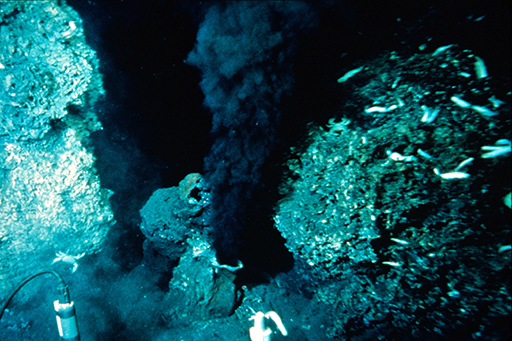2.8 Hydrothermal vents too?
On Earth, there are hydrothermal vents on the ocean floor, mostly around mid-ocean ridges. These are areas where hot magma is close to the surface. Water in the crust becomes heated and dissolves minerals from the crust. This hot water rises out of the crust and can precipitate the dissolved minerals to form chimneys. Examples like this one are called ‘black smokers’ on account of the black mineral particles that precipitate when the hot chemical-rich water meets the cold ocean-floor water.
Microbes have been found around these vents and they use hydrogen sulfide and other chemicals as their energy source. This is an example of ‘chemosynthesis’, using chemical energy to power life; sunlight is not used at all. These ecosystems also support more complex organisms such as tube worms and shrimps.
If hydrothermal vents exist on Europa’s ocean floor, life could exist there no matter how deep and dark. There is some evidence that life on Earth may have actually begun at hydrothermal vents, so could life have originated independently on Europa in the same way?
See also: More information on hydrothermal vents [Tip: hold Ctrl and click a link to open it in a new tab. (Hide tip)] . An overview of where life could occur and a discussion of how we might explore Europa can be found in the article 'Searching for life where the Sun don’t shine (part 6): explorations to the seafloors of Earth and Europa' in Astrobiology Magazine.

